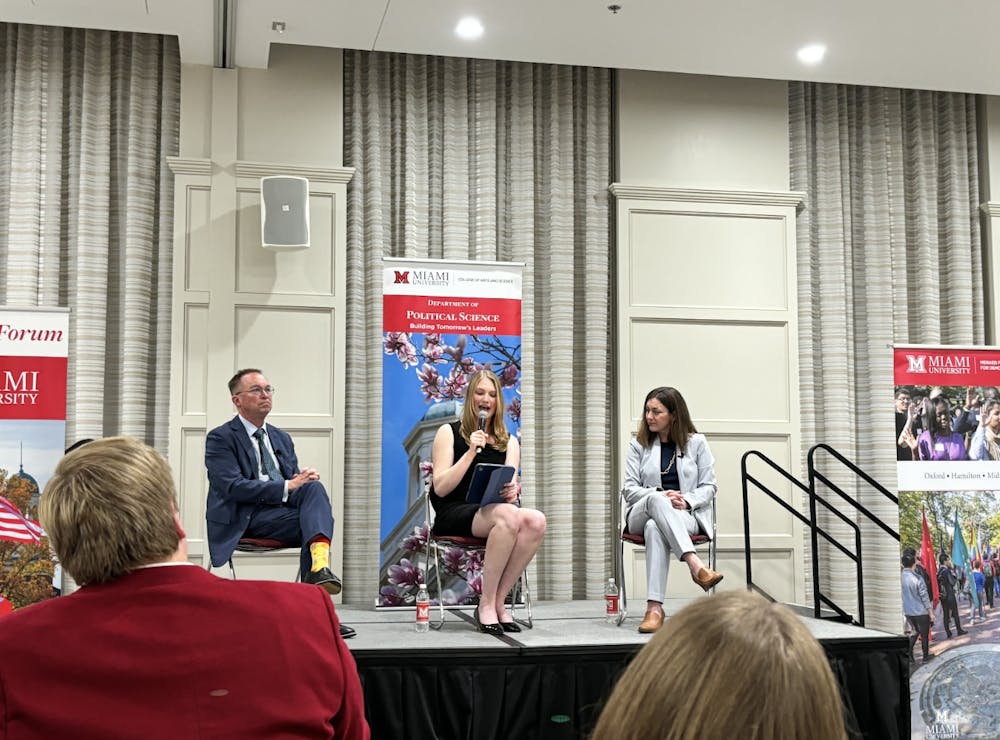The Department of Political Science hosted Mick Mulvaney, former President Donald Trump's chief of staff, and Tiffany Muller, president of End Citizens United and Let America Vote, on April 15 for the spring 2024 JANUS Forum. This semester, the forum was entitled “Bought and Paid For? Money, Speech, and Elections in America.”
The two guests discussed money’s role in financing candidates during elections and the Supreme Court case Citizens United v. Federal Election Commission (often known as “Citizens United”).
In 2010, the Supreme Court ruled in a 5-4 decision that corporations providing funding for independent political broadcasts cannot be limited in their contribution amount. However, since the ruling, there has been discussion about overturning the case.
Mulvaney provided an opening comment, emphasizing the importance of maintaining precedent on the decision.
“[The Citizens United ruling is] better than the alternative,” Mulvaney said, “which is why I make the case tonight that even though you might not like the way this decision came down, it’s the right decision, and that we can live with it, and it’s not going to be the end of the world.”
Muller responded with her opening remarks, countering that Citizens United has wrongfully put a price tag on the election process.
“The Citizens United decision was particularly disastrous on our political system,” Muller said. “It just let in a flood of unlimited and undisclosed [money that’s] connected to every single issue that we all care about.”
Muller also made a point that one of her organization’s main objectives is to pass the Freedom to Vote Act, which would limit “big money” in politics, expand and preserve the right to vote and prevent gerrymandering.
“I don’t believe money is the most powerful force in our politics,” Muller said. “I believe it’s people.”
The conversation then shifted to how campaign financing laws and Citizens United impact trust in the government and the political process. Mulvaney answered first, stating that the court ruling and finance restrictions did not affect his ability to run for federal office when he represented South Carolina. He also said that money is not necessarily a source of evil in politics.
Mulvaney went on to discuss how, while politicians could theoretically be corrupted by money, it doesn’t tend to happen.
“What happens in elections is you get money from people who have already looked at you and said ‘You know what, I like the way this person thinks … so I’m gonna go try and raise money to help that person,’” Mulvaney said. “That’s what most of this money is all about.”
Enjoy what you're reading?
Signup for our newsletter
Muller said that access to money is essentially required to even decide to run for office, resulting in a government that doesn’t mirror the makeup of the United States.
“You decide that you want to run for Congress, and the first two questions are: ‘How much money can you raise?’ and ‘Can you take 18 months off of work in order to campaign?’” Muller said. “This is why we ended up with a Congress that, frankly, doesn’t represent or reflect America.”
Mulvaney also talked about raising money while campaigning, particularly how the fundraising process is not the central goal of a politician.
“I hated the amount of time I had to spend raising money, it’s not the job I thought I wanted,” Mulvaney said. “I wish that [campaigning] could have been a debate between two people … allowing people to get together to have their voices heard is actually a good thing.”
To close out the forum, Muller and Mulvaney came together in agreement on the topic of gerrymandering. Mulvaney began by pointing out states in the 2020 election that experienced the impact of the issue and stated that congressional districts do not need to be drawn up this way.
“[Gerrymandering] is not in the Constitution,” Mulvaney said. “States can choose to allocate their delegations in any way they see fit. I would offer [ending gerrymandering] as a way to fix some of the problems while still preserving our procedures.”
Muller, though politically across the aisle, echoed the same message.
“Gerrymandering has got to go,” Muller said. “We shouldn’t have racial gerrymandering. We shouldn’t have partisan gerrymandering. I couldn’t agree more.”
The forum was attended by many students and faculty members, including Kirsten Osteboe, a sophomore diplomacy and global politics major. After following the 2020 election and the beginning of the 2024 election, Osteboe found the subject of the forum relevant and important.
“I think [the topic] is really prevalent right now, especially going into an election year,” Osteboe said. “I think it’s a big concern right now, especially because so many states are either passing laws to make voting easier or harder for specific groups of people, and I think it’s something that needs to be talked about.”
Anne Whitesell, an assistant professor of political science and associate director of the Menard Family Center for Democracy, a co-sponsor of the event, was also in attendance.
“I think this is one of the rare times where students get to hear from multiple sides about an important issue,” Whitesell said. “Usually, we live in echo chambers where you're just hearing your own side. So I think the JANUS Forum is a nice opportunity for students to hear multiple perspectives.”
The next JANUS Forum will take place in the fall of 2025. Students looking to get involved with the organization’s executive committee can find more information on The HUB.




